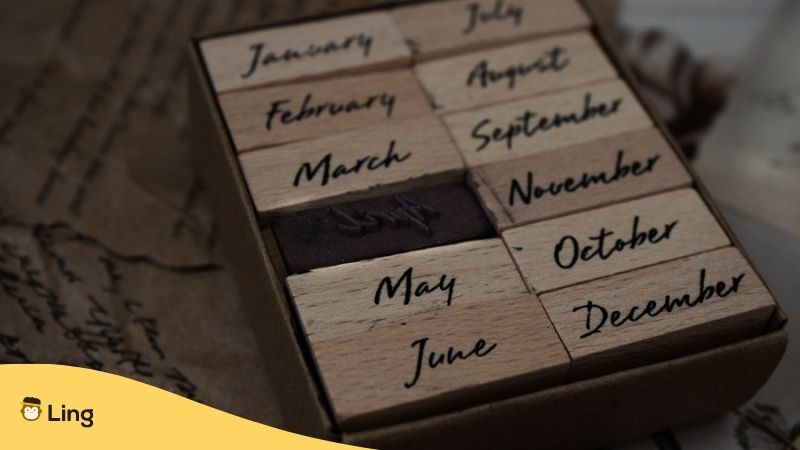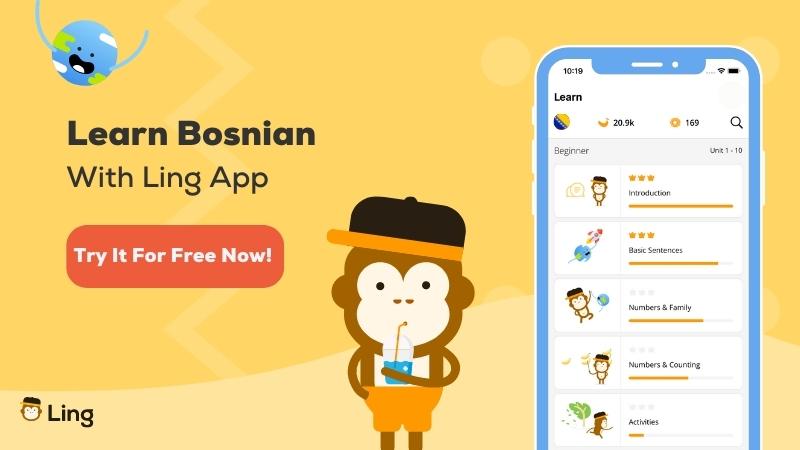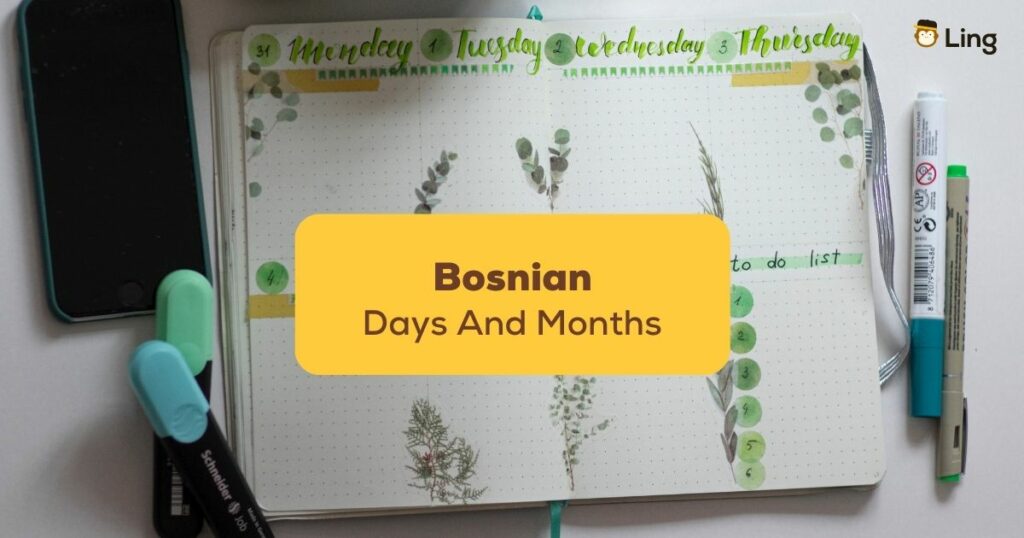As with learning any new language, it is important to get the basics right, and learning Bosnian days and months is essential. Although you could learn basic Bosnian from easy books, in this blog, we will delve a little deeper than basic translations. So let’s dive into the Bosnian calendar and look at its history and inevitable influence on the country’s culture.
One of the most critical aspects of Bosnian culture is its calendar. Various factors, including religion and history, influence the Bosnian calendar. Basically, the calendar plays a crucial role in the daily lives of Bosnians, as it governs essential events and celebrations throughout the year. From religious holidays to national commemorations, the calendar reflects this fascinating country’s rich and diverse cultural heritage.
The Bosnian Calendar
The Bosnian calendar is a combination of the Gregorian and Islamic calendars. The Gregorian calendar is used for civil purposes, while the Islamic calendar is used for religious purposes. The Islamic calendar is based on the lunar cycle, while the Gregorian calendar is based on the solar cycle. The Bosnian calendar includes both Gregorian and Islamic dates, and this has resulted in some unique features.
Days Of The Week In Bosnian
The days of the week in Bosnian are similar to those in other countries and, like most other countries, consist of seven days. They are as follows:
| English | Bosnian |
| Monday | Ponedjeljak |
| Tuesday | Utorak |
| Wednesday | Srijeda |
| Thursday | Četvrtak |
| Friday | Petak |
| Saturday | Subota |
| Sunday | Nedjelja |
Cultural Traditions
Each day of the week has its cultural tradition:
Monday is considered a day of hard work and productivity. If you work hard on a Monday, the rest of the week will be much easier.
Tuesday is a day for new beginnings, often associated with fresh starts, change, and new opportunities.
Wednesday is considered a “middle” day associated with balance and stability.
Thursday is a day for family and friends, and it is often a time when people gather to socialize and enjoy each other and the children’s company.
Friday is a day of relaxation and preparation for the weekend. In Bosnia and Herzegovina, having a family dinner on Friday evening is traditional.
Saturday is a day for fun and entertainment, and it is often when people go out to enjoy the country and nightlife.
Finally, Sunday is a day of rest and reflection. It is considered a holy day, and many people attend church services. It is also a time when families gather together for a big meal and spend quality time with their kids.

Months Of The Year In Bosnian
The Bosnian calendar unsurprisingly has 12 months, and they are named after their corresponding months in the Gregorian calendar, so they are easy to read and learn. The months of the Bosnian calendar are as follows:
| English | Bosnian |
| January | Januar |
| February | Februar |
| March | Mart |
| April | April |
| May | Maj |
| June | Juni |
| July | Juli |
| August | August |
| September | Septembar |
| October | Oktobar |
| November | Novembar |
| December | Decembar |
Islamic Months In The Bosnian Calendar
In addition to the Gregorian months, the Bosnian calendar also includes the Islamic months. The Islamic calendar is based on the lunar cycle and is used for religious purposes. The Islamic months are:
- Muharram
- Safar
- Rabi’ al-Awwal
- Rabi’ al-Thani
- Jumada al-Ula
- Jumada al-Akhirah
- Rajab
- Sha’ban
- Ramadan
- Shawwal
- Dhu al-Qidah
- Dhu al-Hijjah
The Islamic months do not correspond to the Gregorian months; their length can vary from 29 to 30 days. The start of the Islamic year is marked by the first day of Muharram.
Islamic Holidays In The Bosnian Calendar
The Bosnian calendar also includes key Islamic holidays celebrated according to the Islamic calendar. Some of the essential Islamic holidays in Bosnia and Herzegovina are:
- Eid al-Fitr: This holiday marks the end of Ramadan, the month of fasting. It is celebrated on the first day of the Islamic month of Shawwal.
- Eid al-Adha: Commemorates the sacrifice of Prophet Ibrahim. It is observed on the 10th day of the Islamic month of Dhu al-Hijjah.
- Mawlid al-Nabi: A holiday recognizing the birthday of Prophet Muhammad. It is celebrated on the 12th day of the Islamic month of Rabi al-Awwal.
Public Holidays In The Bosnian Calendar
In addition to Islamic holidays, Bosnia and Herzegovina also celebrates public holidays, and here are a few to pop in your diary:
- New Year’s Day: Celebrated on January 1st.
- International Women’s Day: Observed on March 8th.
- Labour Day: Celebrated on May 1st.
- Victory Day: Commemorates the end of World War II and is celebrated on May 9th.

Seasons In Bosnia
Now we are familiar with the Bosnian days and months, it is worth taking a quick look at the seasons.
Winter (Zima)
Winter lasts from December to February, characterized by cold temperatures, snow, and frost. The country’s mountainous regions, such as Bjelašnica, Jahorina, and Vlašić, are popular winter destinations for skiing and other winter sports. The capital city, Sarajevo, also transforms into a winter wonderland during this time, with its Christmas markets, ice skating rinks, and hot mulled wine.
Spring (Proljeće)
Spring runs from March to May. The weather starts to warm up, and the landscape comes to life with blooming flowers and trees. It is an excellent time for outdoor activities such as hiking, cycling, and exploring the countryside.
Summer (ljeto)
Summer spans from June to August and is the peak tourist season. The weather is hot and sunny, with temperatures reaching 35 degrees Celsius. The country’s stunning coastline, including the famous city of Mostar, attracts tourists to enjoy swimming in the sea, sunbathing, and water sports.
Autumn (Jesen)
Autumn kicks off in September and lasts until November. The weather cools down gradually, and the landscape and nature transform into an array of beautiful colors. This is an ideal time for hiking, mountain biking, and exploring national parks.
Live Every Day To The Fullest With Ling App

Learning the Bosnian days and months is just the beginning of your adventure into the language and culture of this beautiful Balkan country. By downloading the Ling app to your mobile, you will always be able to access language lessons and blogs that cover a whole range of topics relating specifically to Bosnia. Learn quickly with the Ling app’s unique learning tools, such as fun games and quizzes. Download now at Google Play and App Store.































